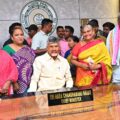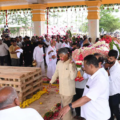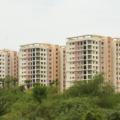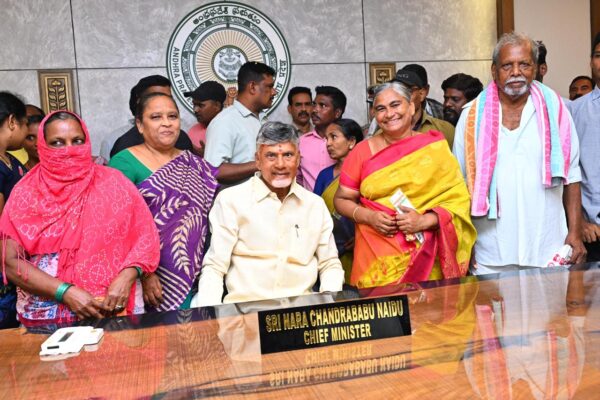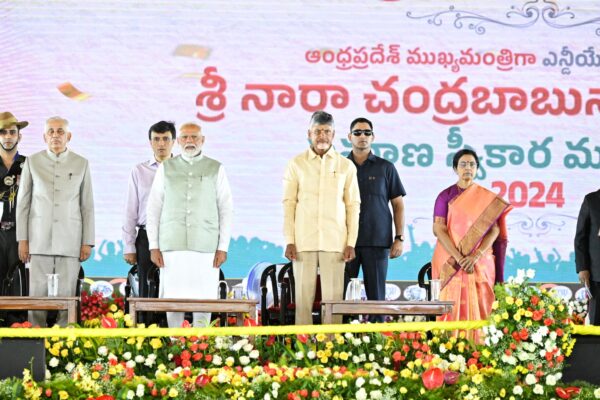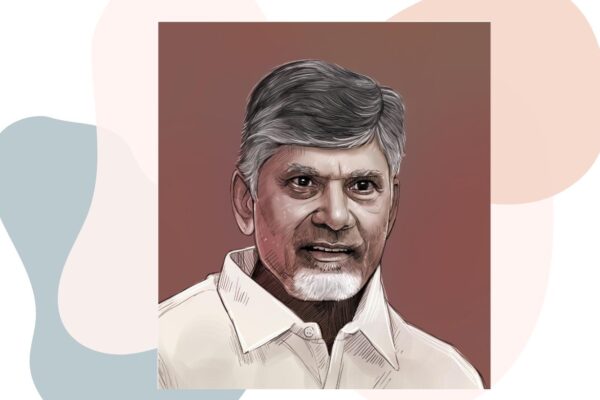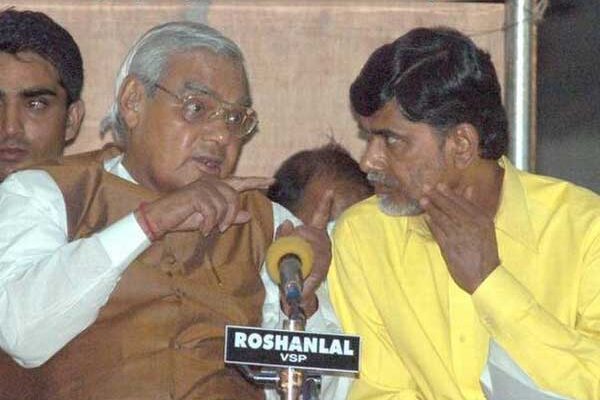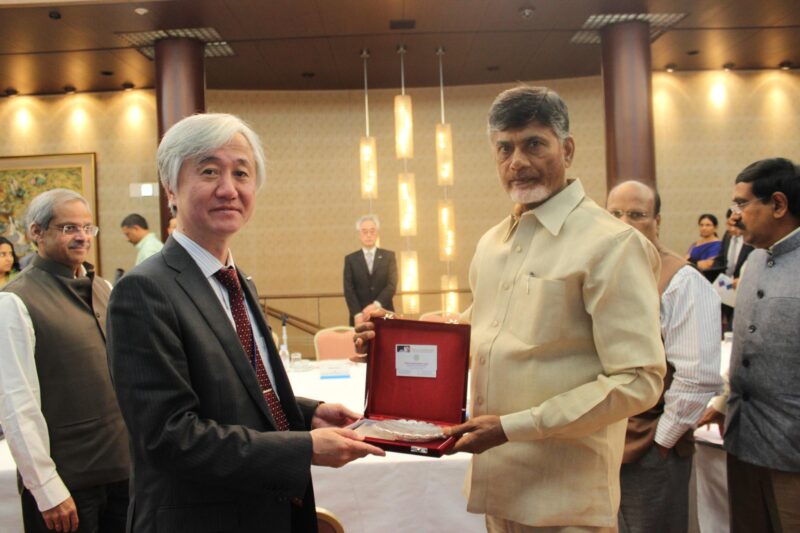
Yogendra Kalavalapalli | LiveMint.com | June 02, 2015
Electioneering was at its peak in Japan when Andhra Pradesh (AP) chief minister N. Chandrababu Naidu visited the island nation on 24 November. Apart from leading multinationals, he was eager to meet one man: Japan’s Prime Minister Shinzo Abe.
Abe was a busy man—the election was a sort of referendum for his economic policies. But Naidu persisted and eventually succeeded. He lost no opportunity in charming Abe by gifting him a ladoo from the holy shrine of Tirupati.
He told Abe, a Shintoist-Buddhist, about the reverence for Lord Balaji in India and wished his Liberal Democratic Party (LDP) success. (In the December election, LDP won 291 of 475 seats in Japan’s House of Representatives.)
Japan has become a pivot in Naidu’s strategy to revive Andhra Pradesh. But it is not Japan alone. In the last one year, Naidu has been busy wooing foreign investors to the cash-strapped state as he attempts to industrialize the primarily agrarian economy. Naidu, who takes credit for transforming Hyderabad into an information technology hub during his tenure as chief minister of the united state, is looking eastward. He has so far visited Singapore, Japan and China to pitch Andhra Pradesh to potential investors.
“The economic centre of gravity is slowly shifting to the East. This trend of wooing East Asia is a reflection of that,” said Jayaprakash Narayan, founder of the Lok Satta Party. “It is an inevitable thing over a period of time not only for one state, but for all of India.”
Naidu was in Japan just two months after Prime Minister Narendra Modi visited that country in September. South Korea is next on the chief minister’s agenda, two people close to Naidu said, requesting anonymity. A team of bureaucrats, businessmen and consultants are finalizing the agenda for the trip in June, coming immediately after Modi’s visit to the country in May. “He is a smart cookie,” said the first person. “He is piggybacking on the centre’s foreign policy.” The AP government has engaged consultants KPMG and PricewaterhouseCoopers to touch base with foreign governments, firms and financial institutions.
The pitch
Naidu begins his pitch by talking about the Union government’s Make in India campaign, the huge market and growth potential in India, and how life is getting easier for businesses under the Modi government.
He then proceeds to pitch Andhra Pradesh as the gateway to the country’s hinterland, and the potential for the state to become a logistics hub on India’s east coast. “He makes sure to highlight the prime minister’s agenda. He does that first,” said a businessman who accompanied Naidu on foreign trips. “He says, ‘Come to India. But come to AP.’ He projects AP as the gateway to India.”
The state has India’s longest coastline in the east stretching across 974km. Naidu plans to build as many as 14 ports to make it the gateway to South-East Asia. He wants to transform the state into a logistics and transportation hub by attracting investments from manufacturing economies such as China, Japan, South Korea, Singapore, Thailand and Malaysia.
“The coastal states have some advantages. Gujarat and Tamil Nadu are harnessing that,” said Narayan. “AP always neglected its coastal areas because of its focus on Hyderabad, the capital city, real estate-driven development and political and economic centralization. Now that there is a compulsion, they have to focus on their region. They have no choice.”
People who travel with him on foreign tours say Naidu has untiring energy. His day begins at 7am and he’s on the move till he rests at 11pm. All the while, he is meeting corporate executives or visiting projects—tourism and infrastructure—that he could replicate in AP. For example, he took a cruise from Clarke Quay to Marina Bay in Singapore to understand river clean-up and tourism—lessons that would help in Amaravathi, the new state capital coming up on the banks of the Krishna river. In Japan, he visited the San-no storm water reservoir site to learn flood-control management and the Nakata waste management system in Fukoka.
Meanwhile, Singapore has gained greater acceptance in AP with architects from the city state designing the master plan for the new state capital free of cost. Naidu has visited Singapore twice (in November and March) in the past six months. He is trying to understand the South-East Asian nation’s makeover into a leading financial hub—something that he’s trying to replicate in Amaravathi, an area 10 times the size of Singapore. The Lee Kuan Yew School of Public Policy in Singapore is helping the state to draft policy frameworks for ease of doing business.
Riding on the centre’s effort to make electronic hardware in India, Naidu is encouraging Asian companies to come to AP. The 2014 Union budget had identified Kakinada, a coastal town in AP, to be developed as a hub for hardware manufacturing. In May, infrastructure firm GMR Infrastructure Ltd, which operates a 10,500-acre, multi-product special economic zone in Kakinada tied up with China’s Guizhou International Investment Corp. to jointly develop a 2,000-acre industrial park with an investment of $500 million.
Guizhou International promised to bring in Chinese manufacturing companies making electronics, power equipment, wind and solar energy and smart technologies to the park at an estimated investment of $2-3 billion over five years, according to the agreement between the firms. A GMR subsidiary also signed a pact with Hangzhou Huatong Industries Inc. to set up a toy manufacturing unit in Kakinada during Naidu’s six-day visit to China in April, a month ahead of Modi’s visit.
Japanese opportunity
Naidu wants a large piece of the $35-billion pie Japan has committed to invest in India over the next five years. He is looking for Japan’s help in building Amaravathi and wants Japanese firms to set up base in the state. “In fact, he says that ‘when I was CM last time, I was focusing on the US. This time I am focusing on Japan’,” says the second person close to Naidu.
So upbeat is Naidu about Japan that he is considering introducing the Japanese language in AP’s universities, opening a desk with Japanese-speaking officials in Japan’s embassy, starting a dedicated cell to clear proposals from Japanese companies online, and setting up a separate industrial city for Japanese investors.
During the Japan trip, the AP delegation met executives from 500 companies, including SoftBank Corp., Toshiba Corp., Mitsui & Co. Ltd, Isuzu Motors Ltd, Fuji Electric Co. Ltd, Panasonic Corp., Uniqlo Co. Ltd. (clothing brand), Sumitomo Corp., Sumitomo Mitsui Banking Corp., Yanmar Co. Ltd (agriculture machinery and diesel engines) and Nidec Corp.
Some of the meetings yielded results. Japan’s minister for economic trade and industry (METI) Yoichi Miyazawa on 28 April offered help to build AP’s capital, including financing the construction of Amaravathi and providing for transportation.
The state government is also talking to Japanese International Cooperation Agency and Asian Development Bank to finance pockets of the Vizag-Chennai Industrial Corridor. AP also signed a pact with METI to promote direct investment by Japanese firms in areas such as urban development, infrastructure, manufacturing, agriculture, food processing and IT.
Mayewaka Manufacturing Co. Ltd., Japan’s largest poultry processing machinery manufacturer, has come forward to build a mega food park in Nellore district, 175km from Chennai, with an investment of $8-9 billion from 24 Japanese firms, including in cold chain infrastructure.
Sumitomo Corp. will also develop a 4,000MW coal-fired power station in Srikakulam district besides assisting the government get foreign investments in the food-processing industry.
However, not everyone is convinced.
Mohan Guruswamy, president of think-tank Centre for Policy Alternatives, says not much manufacturing will move to AP and that Asian firms will only be interested in infrastructure and real estate investments.
“Asian MNCs look for easy land and giveaways. But the land bill will make land expensive for governments,” said Guruswamy. “Vizag offers a good potential for many industries, but it needs a good international-class airport. Since the traffic is not there now, AP might have to invest in one,” he said.
